Interview - Powers : Let's talk with Sharlto Copley
By Mulder, Paris - Los Angeles, 09 march 2015
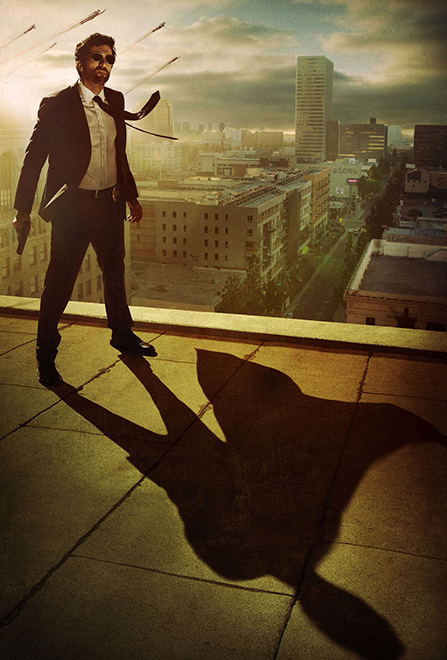
Hi everyone. Thank you guys so much for joining the call today. Powers in an edgy dramatic series inspired by the graphic novel of the same name follows the lives of two homicide detectives, Christian Walker played by Sharlto Copley and Deena Pilgrim who are both assigned to investigate cases involving people with extraordinary abilities referred to as powers. Set amidst today's paparazzi culture, Powers asks the question what if the world were full of superheroes who aren't actually heroic at all. And to the men and women of the Powers Division, the only people brave enough to go up against the overpaid commercialized super humans who glide through the sky imposing their power over the crowds below who both worship and fear them.
Q: What Can you tell us about your character
Sharlto Copley:So Christian is a former super power himself. He was a former superhero and was one of the most famous superheroes in this Powers world until he lost his powers and is now a detective at Powers Division where the police use him because he has contact with powers. He has an understanding of how powers work, how to read different powers behavior. But very much is a conflicted man in the sense that he really would love to get his power back. When he was a superhero he wasn't very responsible either. He was a hero and he saved a lot of people but very much in the manner of kind of a crazy rock star he was also into drugs and, you know, sleeping with groupies and that sort of thing. And so he's kind of haunted by some of his demons in the sense of some of his behavior back then. And so he's a sort of complex and flawed and interesting character.
Q: Hi Sharlto and thank you for answering my questions. I would like to know if you think that Powers is a more adult superhero story than the one we might be used to see on American TV.
Copley:Great question. I mean it's definitely a more adult take on the superheroes genre. You know, I was thinking and talking to a friend of mine the other day and we were saying how, you know a lot of the superheroes you see today come like from the 50s or the 60s and they're sort of rehashed again and again in a very sort of I suppose child friendly way that sort of works. This story is a much more I think realistic take and exploration onto - into the concept of super powers. There are, you know, as much as the superheroes we see sort of known and loved in the traditional kind of sense that we've seen many, many times, you're not going to see in those shows or those TV shows or those movies, you know, a superhero autopsy happening or wondering, you know, what superheroes are like when they have sex wondering what the power does to them and really seeing how they deal with that. You know, does being super powerful corrupt them. And the guys that don't have some much powers like this - one thing I love about this world is that people with varying degrees of powers like they are in real life in sort of metaphor that the show has of the show business industry. There's people with different degrees of power. And so you might get a guy now well you could just levitate three feet off the ground, you know. What does he do with that? He just kind of shows off in front of his friends. There's very little that he can actually do. Or if you could fly, does that mean you would fight crime? You know, and how would you make money doing that with your ability to fly? So I think yes, it's definitely a more adult take on the world of superheroes.
Q: Does it mean that you're going to have to be realistic even the way that it's filmed? Because it seems that at the same time it's quite (popish) if I might use that, colorful. You know, it's not the Dark Knight. It's not Batman, the Dark Knight.
Copley:Yes. They have gone for quite a (popish) kind of look in this first season. And I think some of that was the idea of trying to echo the idea of the pop culture, the superheroes in this world are very much akin to the pop culture icons of our time right now that you find in music or television or film. So I don't think you have to go necessarily with a gritty sort of super real documentary feeling to explore the subject matter in that way. It's still quite heavily stylized into how they're shooting the show. And it's interesting. It's an interesting combination of kind of super real and deep characters but still shot in a very stylized way.
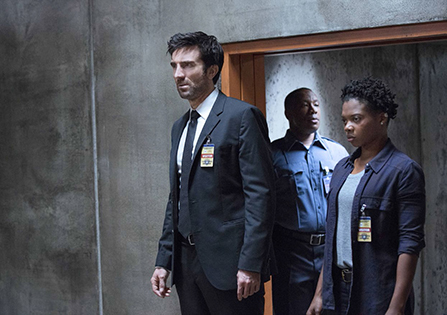
Q: I wanted to ask you about the (poster) of the TV show and the (top line) is the real power lies within. Considering that, can you tell me - can you tell us what is your character's real power from the (inside)?
Copley:Fascinating question. Well, if I told you everything, I'd be giving away too much of the show. But it's - the exploration into power and what power is and where it lies is one of the things that I think is most fascinating about this show. You have the external stuff of obviously power is, you know, being able to fly or kicking ass, et cetera or using guns or putting people in jail or - and all of that normal kind of exterior conflict. But really to me what that statement is referring to has got to do with Walker's challenges within himself and his ability to kind of face and deal with his own demons, which I think is the hardest thing actually for most people, you know, is to face your flaws and to sort of see how much of the - of your behavior you can actually control. You might be able to see, okay, this type of behavior is wrong in this given instance but it's alluring or it's attractive or it's going to be fun for my five senses to do it. So maybe I will. So to me that statement is a hint at what Walker's going to have to learn for himself as he wants to get that power back. And, you know, as in the power to fly, he gets to face a whole bunch of internal challenges. And the question is how strong is he internally to deal with those challenges.
Q: I would like to have your take on what I feel like a melancholy feeling to the episodes that we were able to see. This melancholy feeling that according to me as something like superheroes are not what they used to be. Like the main characters would be old rock stars that would say, you know, pop music is not what it used to be and that there is this quite unusual feeling of not all superheroes but superheroes that are - have to face a world that they don't understand anymore and that they feel would be old fashioned so to speak.
Copley:Yes again, very much the metaphor of the entertainment industry and the way that people seek fame and they seek power and very much mirroring our society today your old school superheroes that were really the big stars of the superhero world, Christian Walker's character Diamondback in the day, Retro Girl for example as being two of them. I mean these are people that have had the real experience. They've done the really crazy stuff. And they're watching the kids come up now who are all about just trying to get as much attention as they can on their social media platforms and really just seeking the fame part of it. So they have a - the old school superheroes have more of a - it's very interesting you pick that up. You know, they have a - they have more jaded view I suppose but also more realistic view of what it takes to actually be a superhero for a long time and it's not all the glamour and the glory of it. There actually is a part of it that's hard work and painful and depressing when things go wrong. So yes, you do have these two worlds of the bright eyed, bushy tailed, young super powers want to be that they call and the people wanting to get out there and become a famous super hero but without realizing at what cost that is going to come.
Q: I wanted to ask you your personal inspirations for creating this character. Do you have a favorite story or character from the comic book that (possibly) clearly inspires you?
Copley:I pretty much went from the scripted versions of the character. They asked me not to get too into the original comic book series for example to look at Walker's character there. I wasn't familiar with the comics when I came into the show and I - first thing I wanted to do is go through them at length. And Charlie, the show writer said to me, "Look. We'd really - Ron and I would prefer you to just kind of look at him on the pages of these first two or three episodes and take your interpretation from there." And so it was really working from that. And I didn't have any specific characters in mind. Obviously the original character in the comic books is a major inspiration to what they did in the TV script. But I really just went from what I read on the pages and drawing a lot from, to be honest, experiences in my life so far in show business as an actor. Things that had happened and things that I'd seen since District 9 kind of mixing in this very high-level show business circle. There are a lot of interesting analogies. Things like I was talking at earlier. You know, what is the price of fame and success? There is - everything comes with some sort of pros and cons in life. And so I was drawing I guess a lot on kind of real life experiences and feelings and instincts and things that I had experienced since District 9.
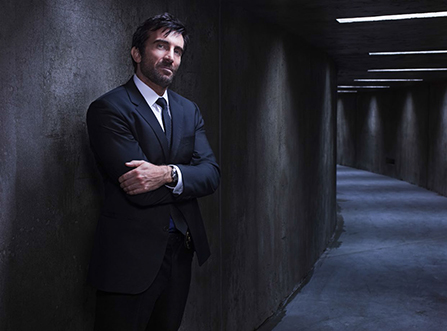
Q: Just talking about District 9, I'm not sure you can talk about that now but just I wanted to ask you about the Neill Blomkamp's recent statement about Alien 5; do you think there is a role for you in this?
Copley:At the moment I don't know. You know, Neill has always expressed - I don't think so because he's always - each time he's done it for me he's like, "Dude, I'd love to put you in everything but I can't put you in every movie surely. That doesn't make sense, you know, strategically." So even if he's creatively tempted as he probably has been, I don't know whether he's - whether he's going to do it again. I don't think so.
Q: So about who you said there's a lot of metaphors and there's a lot of real life comparisons obviously. But are you still going to go for something like saving the world or some kind of - because this is all very intimate problems that we see at first. Is it going to stay like that or do you have still like, you know, every superhero has to save the world at some point?
Copley:Very true. Every superhero does have to kind of save the world or at least think in his own mind that he was important enough that he did something to save the world, which would be the case in our characters. Yes. It gets - I mean what's interesting about the TV show is that as opposed to - and what I'm learning obviously about television as opposed to film is you have time to unravel these things. And I think the interesting thing with the show and the Season 1 it really does go somewhere. It's not a show that's just, you know, messing around and trying to see how long it can hold you with various sub plots. There are some major story points that it's heading towards. And yes, without giving anything away, I mean we do have these issues of saving the world and kind of classic superhero (arched) types of the heroes and villains but just much more complicated and I think much more realistic takes on them. But that kind of stuff does happen in the first series.
Q Could you just - as a follow up, could you just (develop) up - when you say much more reality what does it mean? I remember one of the very nice sentence that Retro Girl said when she's saying, you know, there's a big storm coming and I'm going there. I'm going to try to save as many people as I can. But I've only two hands (but you see) I cannot save the world.
Copley:Yes. I mean that in itself is your point. You know, you spoke to well are the characters going to save the world. And I said well in their minds they have to feel like at least they're doing something to try and save the world. But it's a much more realistic take on that, you know, knowing that you can't save the whole world just because you're a superhero and you have some super powers. But you can certainly save a bunch of people but you're going to have to deal with the pain of not saving the ones you couldn't save. You're going to have to make choices like well, I can only save three and there's ten. Which three do I save? Those are some of the difficulties in your daily life. You know, interesting things like characters like Retro Girl and my character back in the day have agents and managers and press and PR people, you know, to help them make money from what they do. You know, how would Superman really make a living in - if he was actually a real superhero in a real world? So there's a lot of real elements like that. And also, as I was saying before, issues like superheroes that don't have amazing powers, they might just be able to, you know, throw a little bit of fire out their mouths or levitate a little bit off the ground. And they're trying to get noticed or find a way to make a living with those relatively small powers that they have.
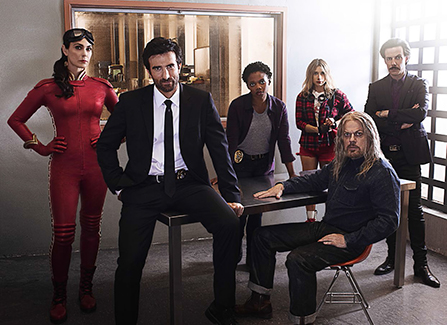
Q: I just wanted to ask you about the show talks about a powerless character in the superhero world. Do you think it's a way to take the opposite view of the current superhero trend in movies or TV shows with superhero everywhere?
Copley:I think - I don't know if it's the opposite view because if you're referring to the fact that Walker himself feels powerless compared to how he used to feel. I mean it is - he is, you know, there's a thing in storytelling, which I really like, which is if you're playing a character that experiences the following, what is the worst thing that can happen to my character that turns out to be the best thing? It's a very interesting sort of deeper metaphoric or not metaphoric - very practical question, mythological question for human beings. Because I think we all have those experiences of going through real pain and things we don't want to happen to us. But then we learn and we grow from those experiences. And human beings kind of know that innately. So this is an exploration more of that. It's what's the worst thing that could happen to a superhero. Well, probably that he loses all his super powers. And then the question is well is it really the worst thing? Does he - was he a good man when he had all those powers? In the case of Christian Walker he was a hero but he wasn't really a good man. He at times abused that situation. He saved many people's lives but he was a very flawed man at the same time. Very much like a rock star that's like, you know, I entertained a lot of people but I hurt a lot of people in my life as well. I think it's more an exploration to that than purposely trying to say well this is the opposite of a, you know, superhero has a power and he has no power. It's an exploration into his loss of power, his wanting the power back and he's asking the question would I - could I behave better this time if I got those powers again or would it still corrupt me in the same way it did when I was a younger man.
Q: It's interesting that - it's interesting, sorry, that you said that the worst thing that could happen to a superhero was to lose his powers because I feel that there is a trend these past years where most of the superheroes that they're as doomed as they are blessed with their powers and they have to live with it. Obviously Spiderman is a good example of a guy who didn't ask for anything. So what about that? What's your analysis on the fact that it's not that cool anymore to be a superhero at least in - it's very popular in movies but the superheroes are not happy people. They are suffering.
Copley:I think it's the inevitable need that - probably that people in the entertainment business have to reflect a society that is becoming more self-reflective than it probably was in the 50s and 60s when you had these superhero stories that were very black and white and very simple. You know, the villain was the bad guy and the superhero was the good guy. Society is definitely starting to ask deeper questions about human behavior and human nature. And I think there's just pressure on entertainment. You know, even with something like a Spiderman that's still handles these things in a very sort of child friendly way to go there more deeply into these scenes. Movies I did like Maleficent, you know, (unintelligible) take on a Sleeping Beauty story is changing. And so I think that's just a reflection of society. And certainly in our show it goes really, really deeply into - because we're allow to be more R rated about these things and kind of explore them in more graphic ways. It's just a side of superheroes that you've never quite seen before. Thank you guys. Thanks for your questions and your time and your interesting. Thank you so much.
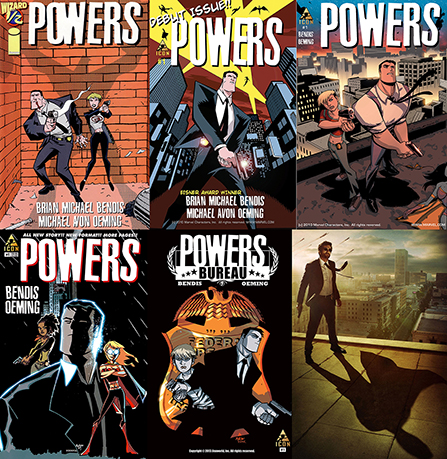
Avec tous nos remerciements à Caroline Luca, Responsable Communication Programmes Séries Communication Programs Series Manager OCS et Alan Closier, Chargé de Communication OCS

